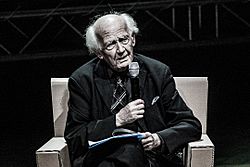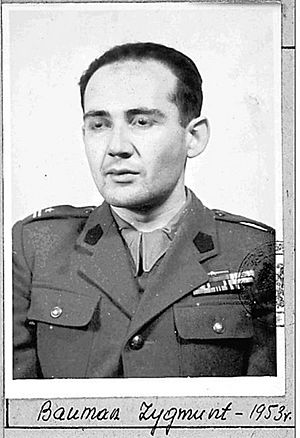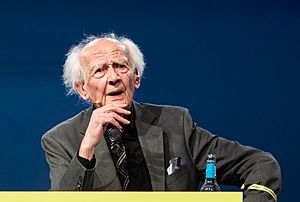Zygmunt Bauman facts for kids
Quick facts for kids
Zygmunt Bauman
|
|
|---|---|

Bauman in 2013
|
|
| Born | 19 November 1925 Poznań, Second Polish Republic
|
| Died | 9 January 2017 (aged 91) Leeds, West Riding of Yorkshire, England
|
| Alma mater | University of Warsaw London School of Economics |
| School | Continental philosophy · Western Marxism |
|
Main interests
|
Ethics · Political philosophy · Sociology · Postmodernity · Postmodern art |
|
Notable ideas
|
Modernity's struggle with ambiguity, resulting in the Holocaust · postmodern ethics · critique of "liquid" modernity · liquid fear · Allosemitism |
|
Influences
|
|
|
Influenced
|
|
Zygmunt Bauman (19 November 1925 – 9 January 2017) was a famous Polish thinker. He was a sociologist and philosopher. He had to leave his home country, Poland, in 1968 because of political problems. He first moved to Israel, then settled in the United Kingdom in 1971.
In England, he studied at the London School of Economics. Later, he became a Professor of Sociology at the University of Leeds. Bauman wrote many books about important social topics. These included ideas about modern life, the Holocaust, and how people buy and use things today. He also wrote about "liquid modernity," a term he created to describe our fast-changing world.
Contents
Early Life and Education
Zygmunt Bauman was born in Poznań, Poland, in 1925. His family was Polish Jewish. In 1939, when Nazi Germany and the Soviet Union invaded Poland, his family fled east to the USSR to escape the war.
A Life of Learning and Change
During World War II, Bauman joined the First Polish Army, which was controlled by the Soviet Union. He worked as a political instructor, helping to guide the soldiers. He took part in important battles, like the Battle of Berlin. In 1945, he received a military award called the Cross of Valour. After the war, he became one of the youngest majors in the Polish Army.
From 1945 to 1953, Bauman was an officer in a special military unit called the Internal Security Corps. While serving, he also studied sociology at the Warsaw Academy of Political and Social Science. In 1953, he was asked to leave the army. After this, he finished his master's degree. In 1954, he started teaching at the University of Warsaw, where he stayed until 1968.
Becoming a Critical Thinker
While studying at the London School of Economics, Bauman wrote his first major book about the British socialist movement. It was published in Polish in 1959 and later in English in 1972. He also wrote "Everyday Sociology" (1964), which was very popular in Poland. This book later became the basis for his English textbook, "Thinking Sociologically" (1990).
At first, Bauman followed Marxism, a way of thinking about society and economics. However, he became more critical of Poland's Communist government. This made it difficult for him to get a full professorship. Despite this, he took over a teaching position at the University of Warsaw in 1962.
Leaving Poland
In January 1968, Bauman decided to leave the ruling Polish United Workers' Party. This was during a time of political unrest in Poland. Many Jewish intellectuals were forced to leave the country. Bauman lost his teaching position at the University of Warsaw. To be allowed to leave, he had to give up his Polish citizenship.
In 1968, he moved to Israel and taught at Tel Aviv University. In 1970, he moved to Great Britain. He became a professor of sociology at the University of Leeds. From then on, he mostly published his works in English, which was his third language. His reputation as a thinker grew around the world.
Key Ideas and Works
Bauman wrote 57 books and over a hundred articles. His main topics included globalisation, modernity (modern times), postmodernity (the time after modern times), consumerism (buying and using goods), and morality (what is right and wrong).
Understanding Modern Life
In the late 1980s and early 1990s, Bauman wrote many books about how modern society works. He explored how bureaucracy (systems of rules and procedures) and rationality (thinking based on logic) affect people. Bauman believed that modern European society traded some freedom for more personal safety.
He argued that "solid" modernity tried to remove all unknowns and uncertainties. This involved trying to control nature, using strict rules, and categorizing everything. The goal was to make life feel orderly and safe. However, Bauman felt that this order-making never fully worked. There were always groups of people who didn't fit in or couldn't be controlled.
The Idea of the "Stranger"
In his book Modernity and Ambivalence, Bauman wrote about people he called "the stranger." These are people who are present but unfamiliar. They are society's "undecidable" ones. He explained that modern society has different ways of dealing with strangers.
- On one hand, in a society focused on buying things, new and unfamiliar things can be exciting. This is why people enjoy different foods, fashions, and travel.
- On the other hand, strangers can also cause fear. Because they cannot be fully controlled, they are sometimes seen as a threat.
Modernity and the Holocaust
Bauman's most famous book is Modernity and the Holocaust. He argued that the Holocaust was not just a terrible event in Jewish history or a step backward into barbarism. Instead, he believed it was deeply connected to modern society's efforts to create order.
He explained that things like:
- Following rules without question.
- Dividing tasks into smaller and smaller parts.
- Categorizing people into different groups.
- Believing that obeying rules is always good.
All these modern ideas played a role in the Holocaust happening. Bauman felt that modern societies had not fully learned from the Holocaust. He saw the Jews as the ultimate "strangers" in Europe. The "Final Solution" was an extreme example of society trying to remove elements it found uncomfortable or hard to define.
Liquid Modernity and Consumerism
In the late 1990s, Bauman started writing about "postmodernity" and "consumerism". He believed that society had changed from one where people mainly produced things to one where people mainly consumed things. He said this change meant people gave up some safety for more freedom to buy and enjoy life.
Since the year 2000, he used the terms "liquid" and "solid" modernity to explain his ideas. In his books on modern consumerism, he wrote that fears became more spread out and harder to identify. Bauman also created the term allosemitism. This word describes both positive and negative attitudes towards Jewish people as "the other."
Art in a Changing World
Bauman also thought about how art fits into a world that is constantly changing. He suggested that people often desire a constant "becoming" rather than reaching a final goal. The worst thing, he thought, was to be completely satisfied.
He wondered if art could make temporary things last forever. Bauman concluded that in today's fast-paced world, people don't have time for things that are meant to be permanent. He believed that art and culture must change their traditional meaning to make sense in a "liquid" society.
Awards and Recognition
Bauman received several important awards for his work:
- The European Amalfi Prize for Sociology and Social Sciences in 1992.
- The Theodor W. Adorno Award in 1998.
- The Princess of Asturias Award for Communication and the Humanities in 2010 (shared with Alain Touraine).
In 2010, the University of Leeds created 'The Bauman Institute' in his honor. In 2015, the University of Salento gave him an honorary degree.
Family
Bauman was married to writer Janina Bauman. They had three daughters: Lydia, Irena, and Anna. His grandson, Michael Sfard, is a well-known civil rights lawyer. Zygmunt Bauman passed away in Leeds on 9 January 2017.
Images for kids
See also
 In Spanish: Zygmunt Bauman para niños
In Spanish: Zygmunt Bauman para niños
 | Janet Taylor Pickett |
 | Synthia Saint James |
 | Howardena Pindell |
 | Faith Ringgold |




